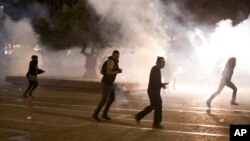Israeli President Reuven Rivlin said Monday that protests against racism and police brutality by Ethiopian Jews have exposed an "open wound" that must be addressed.
"We did not look, and we did not listen enough," Rivlin said. "We are not strangers to one another, we are brothers, and we must not deteriorate into a place we will all regret."
He spoke a day after hundreds of Ethiopian Israelis blocked the main highway Sunday in Tel Aviv. Then they threw stones and bottles at police, who responded with stun grenades.
There was a similar riot in Jerusalem last week. The violence erupted after the airing of a video showing police beating an Israeli soldier of Ethiopian origin.
Ethiopian activist Solomon Shimon says it was an unprovoked act of racism.
"We all of us say, 'Enough is enough,'" he said. "This situation, it is happening everywhere, anytime and we want to stop it. And we want freedom, we want equality.”
Prime Minister Benjamin Netanyahu met with the soldier who was beaten and expressed regret. Netanyahu also met with Ethiopian Jewish leaders and appealed for calm.
He said he was shocked by the beating and his government is working to change the situation.
But the Ethiopian community is skeptical.
Ethiopian Jews say they suffer from police brutality, racism and discrimination in Israel because of the color of their skin.
There are about 120,000 Ethiopian Jews in Israel, a small minority in a country of eight million. And while the Israeli government brought them to Israel in two major airlifts in 1984 and 1991, they have never felt quite welcome.
VOA's Robert Berger contributed to this report from Jerusalem.





